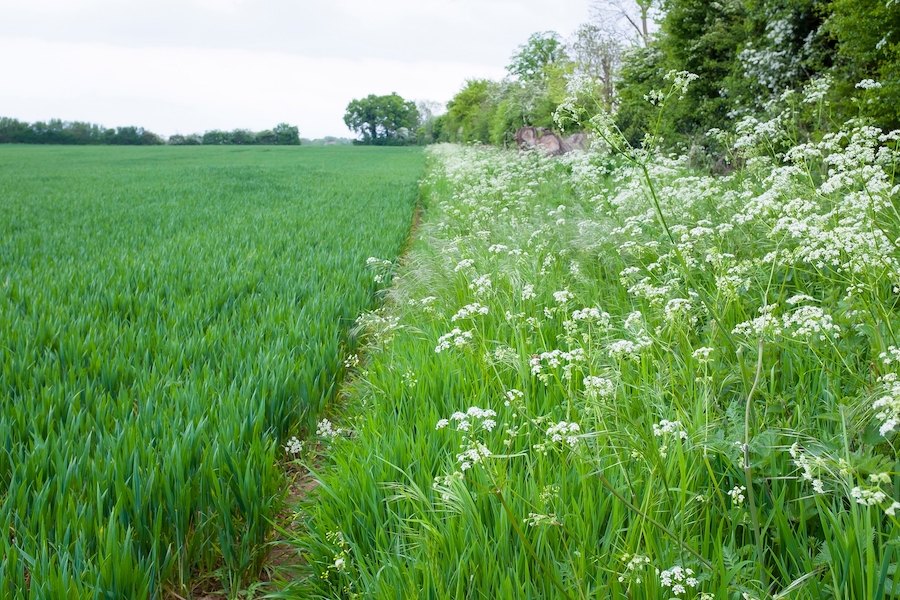BNG: Could your farm benefit from new legislation?
15th February 2024
New BNG rules present an opportunity for farmers and landowners to rent out less productive land to developers, who are now required to provide at least 10% BNG.

New legislation came into force this week (12th February) ruling that developers in England are now legally required to deliver 10% biodiversity net gain when building new housing, industrial or commercial developments.
Previously, developers only had to offset any damage to biodiversity, but regulations now require the additional 10% gain.
If applicants cannot provide this extra 10% on site, they will need to purchase BNG units off site, which is where the opportunity lies for landowners.
Diversified income for farmers
Mark Russell, partner at Carter Jonas, said: “The introduction of mandatory BNG has been a long time coming but will now open opportunities for landowners who are interested in the natural capital markets.
“Selling units is a big commitment as the land must stay in the scheme for a minimum of 30 years, so decisions should be made within the context of a long-term strategy for the farm or estate.”
Environment Bank chair Professor David Hill CBE, who has spent many years lobbying for change, said: “From now on, almost all development will be required to comply with BNG. This much-needed and transformative legislation will deliver vital investment to the natural environment, restoring ecosystems and building resilience against the effects of climate change.”
With no other policy like this in the world, BNG is setting the blueprint for driving vital nature restoration, he added.
“This legislation enables developers to compensate for any ecosystem impacts, investing in nature to serve local communities while helping to provide economic security for farmers.
“The implementation of BNG is a game-changer not just for the biodiversity sector, developers and planners, but also for the country’s farmers. With farming families facing innumerable challenges, the mandating of BNG means a diversified income stream for farmers.”
New rules are “absolutely right”
Commenting on the new legislation, Glenn Buckingham, farm manager at Helmingham Home Farm in Suffolk, said: “I’m sure we will engage at some point; it’s just finding the right project or the right requirement for our landscape. And then remembering that you’re tying up for 30 years, so it needs some serious thought as to where you fit it in. […]
‘[The new legislation is] not just good for the [farming] industry, it’s good for everyone. Rightly so, it’s a tax on development and that’s continued unabated so it’s absolutely right. What we’re saying is that there’s a cost to consumption so it’s probably 30 years too late in starting.”
“We need to ask serious questions”
Discussing the direction of government policy, towards environmental enhancement, Glenn noted:
“The industry is perhaps at a crossroads in how its thinking; there’s a lot of changes at the moment and you have to be certain that your uptake of the scheme is right for this long period and provides sufficient returns to compensate you – not just now. But of course, over a 30-year period there’s inflation – and if it takes off too much like some of the rewilding or the schemes within the SFI, we’ve got to also think about food production. […]
“There must be areas of land which could come out of production, but could they be combined with production to provide net gain? As we face into further elements on climate change, we need to be very careful about losing land for production, so therefore we should combine net gain with production, and that’s something our authorities haven’t completely got their heads around how to deliver that.”

There is also a splintering of different directions taken by the different devolved nations of the UK, and within individual farmers too, he added, noting the wide variety of different views at a recent farmer meeting he hosted – from those who were open to completely rewilding their farm at the cost of food production, to those unwilling to make any changes, and everyone in between.
That spectrum is too wide, Glenn said, arguing that the way forward could be for all farms to do something to address biodiversity and wildlife loss – but it’s a complex issue.
“I don’t think as an industry we’ve ever been in this situation to arguably be asked to cope with so many issues. Within less than a generation we’re pushing for some big change.”
He added: “Those who disengage should be very wary of their future by not taking part. Because of BNG we’re seeing some farms saying ‘I’m preparing for it, “I’m going to stop farming’. Is that right? And we need to seriously ask those questions. It could be that you could enhance the biodiversity of your farm by simply having some livestock, and having more grassland and doing different things.
“It’s not a simple situation. But how much BNG is out there is another matter, and keeping it local to the development is probably important.”
Helmingham Home Farm will be using the Suffolk Farming & Wildlife Advisory Group (FWAG) to point them in the right direction. “There’s FWAGs In every county and I think they are a vital resource in how we plan our way forward,” Glenn said.
Habitat Banks
To ensure the successful implementation of the new legislation, the Environment Bank has created England’s largest Habitat Bank network and can now offer local and adjacent delivery of off-site Biodiversity Units to a third of all LPA areas and more than half of all NCAs.
Its Habitat Banks and Biodiversity Units are fully funded and Environment Bank said it has already secured a vast array of planning applications across England for its clients.
Environment Bank has been a pioneer of the Habitat Bank model since 2007, which involves leasing land from farmers and landowners to preserve and restore natural ecosystems. Farmers and landowners retain ownership and management of the land, receiving tax-efficient annual payments of up to £60,000 per year, secured for 30 years.
The Biodiversity Units from these Habitat Banks are then raised for developers, with Environment Bank taking all liability for Unit delivery. This helps developers meet their BNG requirements while supporting nature restoration at scale.
The organisation says it provides high-integrity Biodiversity Units for developers to meet their BNG obligations, while also providing diversification of income to landowners and farmers by creating habitat banks.
Calls for further action
Whilst the new regulations have been welcomed by many, a briefing by Wildlife and Countryside Link notes that the government’s own impact assessment reveals that 10% BNG does not go far enough.
Tony Juniper, chair of Natural England, told the Environmental Audit Committee last week that BNG is very welcome but will really only help us to stand still, acknowledging that biodiversity is complex and that we are still losing habitats outside of development.
The briefing recommends that the government should:
- Support local planning authorities to go beyond the 10% BNG minimum
- Set a higher than 10% national minimum for major infrastructure projects (BNG will only become mandatory for major infrastructure projects in 2025)
- Ensure authorities have sufficient resources for monitoring and enforcement.
Read more rural stories here.

